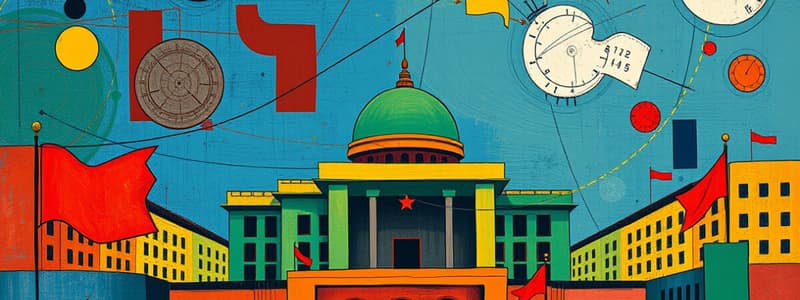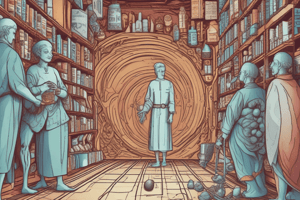Podcast
Questions and Answers
What are characteristics of a centrally planned economy?
What are characteristics of a centrally planned economy?
A central bureaucracy makes all decisions about what to produce, how to produce it, and who gets it. The government owns land, capital, and labor.
Why does even a free market need government intervention?
Why does even a free market need government intervention?
Government intervention protects consumers from dangerous products and fraudulent claims, and regulates industries affecting public well-being.
What does specialization do for an economy?
What does specialization do for an economy?
Specialization leads to efficient use of resources (land, labor, and capital).
How could the Chinese economy be characterized?
How could the Chinese economy be characterized?
What is one of the most important advantages of a free market? (Select all that apply)
What is one of the most important advantages of a free market? (Select all that apply)
Who is a noted free market philosopher?
Who is a noted free market philosopher?
What are characteristics of a traditional economy?
What are characteristics of a traditional economy?
In what kind of economy does the government make all of the decisions?
In what kind of economy does the government make all of the decisions?
What are government safety nets? What do they provide for?
What are government safety nets? What do they provide for?
How would the economy of Canada most likely be characterized?
How would the economy of Canada most likely be characterized?
What is the motivating force behind a free market?
What is the motivating force behind a free market?
What does the doctrine of laissez faire call for?
What does the doctrine of laissez faire call for?
List all of the government safety nets in this chapter.
List all of the government safety nets in this chapter.
In what kind of economy does custom determine what someone does?
In what kind of economy does custom determine what someone does?
In what kind of economy would entrepreneurs have the best chance for success?
In what kind of economy would entrepreneurs have the best chance for success?
What is the role of the government in a centrally planned economy?
What is the role of the government in a centrally planned economy?
What does a socialist believe?
What does a socialist believe?
The purchase and supply of goods and services take place on the _________ market.
The purchase and supply of goods and services take place on the _________ market.
Why weren't collective farms productive in the Soviet Union?
Why weren't collective farms productive in the Soviet Union?
What are the weaknesses/disadvantages of a centrally planned economy?
What are the weaknesses/disadvantages of a centrally planned economy?
Based on the continuum, what countries are closest to a free market?
Based on the continuum, what countries are closest to a free market?
Define interest group.
Define interest group.
Study Notes
Centrally Planned Economy
- Central bureaucracy determines the production, distribution, and pricing of goods and services.
- Government ownership extends to land, capital, and labor.
Need for Government Intervention in Free Markets
- Government provides essential information to consumers, enhancing safety against harmful products.
- Regulation is necessary in industries impacting public welfare.
Specialization in Economies
- Specialization improves resource efficiency by optimizing the use of land, labor, and capital.
Chinese Economy Characterization
- Currently a centrally planned economy transitioning towards a market-based system.
Advantages of Free Markets
- Promotes economic efficiency by effective resource utilization.
- Encourages economic freedom allowing consumer choice and business operation.
- Drives economic growth through entrepreneurial opportunities and innovation.
- Consumer sovereignty plays a pivotal role in determining production.
Noted Free Market Philosopher
- Adam Smith is a key figure advocating for free market principles.
Traditional Economy Characteristics
- Decisions are based on customs, habits, and rituals without significant change.
Command Economy
- A command or centrally planned economy has the government making all economic decisions.
Government Safety Nets
- Programs designed to assist individuals during economic hardships such as layoffs or disasters.
- Examples include welfare programs, in-kind benefits, medical assistance, education support, and faith-based initiatives.
Canadian Economy Characterization
- Canada operates as a free market with elements of government intervention similar to the U.S.
Motivating Force in Free Markets
- Self-interest is the primary incentive driving individuals to participate in the market.
Laissez-Faire Doctrine
- Advocates for minimal government interference in economic activities.
Government Safety Nets in Detail
- Welfare: Taxes collected for aiding the poor.
- In-kind benefits: Provision of free or discounted goods and services.
- Medical benefits: Health insurance support for vulnerable populations.
- Education: Opportunities designed to assist the disadvantaged.
- Faith-based initiatives: Religious organizations aiding the needy.
Entrepreneurial Success
- Entrepreneurs thrive in free or market economies due to greater opportunities and fewer restrictions.
Government Role in Centrally Planned Economies
- The government makes all economic decisions and retains ownership of major economic resources.
Socialist Beliefs
- Socialists advocate for democratic processes to equitably distribute wealth across society.
Free Market Dynamics
- Goods and services are bought and sold in a free market environment.
Soviet Union's Collective Farms Ineffectiveness
- Lack of individual incentives led to poor productivity and quality.
Weaknesses of Centrally Planned Economies
- Common issues include low-quality goods, service shortages, and inability to meet consumer demand effectively.
Countries Closest to Free Market
- Canada, the United Kingdom, and the United States are ranked among those with a near free market economy.
Interest Group Definition
- Interest groups are organized entities aimed at influencing public officials to align with their specific agendas.
Studying That Suits You
Use AI to generate personalized quizzes and flashcards to suit your learning preferences.
Description
This study guide focuses on the key concepts presented in Chapters 2 and 3 of economics, covering the characteristics of centrally planned economies and the necessity of government intervention in free markets. Use it to reinforce your understanding and prepare for assessments.




